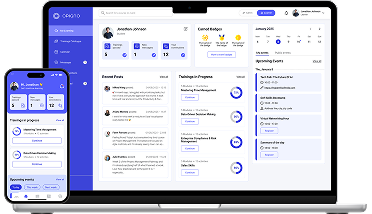The massive role of LMS in learning democratization has long been praised. It allows learners to study at their convenience, erasing time, location, and disability limitations. It reduces costs related to travel, physical materials, and instructor time and multiplies the number of learners one can accommodate. It consolidates all course materials and simplifies content management, ensuring consistent and up-to-date training for everyone.
However, LMS platforms excel beyond online training per se, as they help countless organizations from different domains solve their unique objectives outside simply streamlining the learning process. Let's see how an LMS addresses their issues.

Businesses and LMS: Improving the bottom line and future-proofing the workforce
For commercial companies, the primary objective is to increase profitability. Employee training only succeeds when it results in better productivity and more quality output. Investing in an LMS enhances training efficiency and cost-effectiveness by streamlining and optimizing various training processes, such as:
Structured onboarding programs
LMS platforms allow companies to create and distribute structured and comprehensive onboarding programs efficiently. Consistent, high-quality training ensures new employees become productive faster and increases new hire retention rates, reducing the costs associated with downtime and turnover.
Continuous upskilling
A well-trained workforce is better at driving revenue growth through innovation. Streamlining talent development with an LMS helps companies maintain a competitive edge, increase productivity, and produce better-quality output. Plus, professional development improves employee satisfaction and retention, drastically reducing the costs of hiring and training new employees.
Regulatory compliance training
An LMS ensures all employees receive uniform compliance training, reducing the likelihood of violations. Fewer violations mean fewer fines and a better company reputation.
LMSs also automate the tracking of mandatory courses' completion, which helps avoid costly penalties and decrease the administrative burden.
Performance management and personalized training
LMS platforms integrated with performance management systems allow companies to identify skills gaps, create personalized training plans, and analyze training effectiveness. As a result, companies allocate training resources more effectively, yield the highest possible return, and consistently improve employee performance.
For commercial companies, investing in an LMS is not just about improving training processes. It's about gaining a strategic advantage, driving overall business growth, and ensuring long-term success.

Educational sector and LMS: Ensuring education quality and accessibility
The biggest challenges of educational institutions are maintaining quality, relevance, and accessibility, reducing administrative burdens, and ensuring academic integrity. Apart from being a perfect platform for self-paced distance learning, which solves the accessibility part, LMS helps centralize course materials, personalize learning paths, and streamline assessment and grading processes.
Centralized content delivery
With LMS, instructors upload and update materials once and distribute them instantly to all students, regardless of location. Such platforms also offer more ways to interact with peers and instructors via discussion forums, group projects, etc.
Personalized learning paths
LMSs can use student performance data to adapt the learning path to individual strengths and weaknesses, offer personalized recommendations for additional resources or remedial activities, and assign tailored assessments that minimize opportunities for cheating.
Streamlined assessment and grading
LMSs support various assessment types and offer tools like timed tests, plagiarism detection, and proctoring software to help maintain academic integrity.
For objective assessments, such as quizzes and multiple-choice tests, LMS can grade submissions automatically, freeing up instructors' time and giving students real-time feedback on their performance. Plus, all assessment data is stored in a single platform, making tracking student progress, generating reports, and maintaining accurate records easier.
LMS enables educational institutions to provide students equal access to relevant knowledge and transparent assessment while streamlining the administration.
If you want to see an example of how Opigno helped a leading pet food manufacturer transform the learning experience for a veterinary continuing education program, take a look at this success story.

NGOs and LMS: Maximizing community impact per dime
NGOs' resources are often stretched thin, so their primary objective is to maximize impact through capacity-building and educating broad audiences with minimal investment. LMSs are instrumental in achieving this by offering scalable and cost-effective training solutions.
Scalability
LMSs enable NGOs to deliver the same high-quality training to thousands of people, reaching the most remote and underserved communities. They automate administrative tasks like enrollment, progress tracking, and certification, reducing the workload on NGO staff. And by delivering training online, NGOs can save on physical training costs.
Leveraging open resources
LMSs support most content formats, which means NGOs can use open educational resources to develop training programs, reuse and update them as needed, tailor them to specific communities, and adapt materials to local languages and cultures, significantly reducing the financial burden.
Impact tracking
LMS platforms provide detailed analytics on training participation, progress, and outcomes, enabling NGOs to measure their programs' reach and impact. This is crucial for transparency, accountability, and attracting funding from donors and stakeholders. Plus, LMSs' tools for collecting feedback allow NGOs to continuously improve and adapt their training programs to better meet community needs.
By implementing an LMS, NGOs can deliver impactful training programs at a lower cost, creating positive change within their communities.
To learn more about how Opigno empowers NGOs to change the world for the better, be it through social or environmental initiatives, check out the success stories of A2ii and IUCN.

Global brands and LMS: Ensuring brand integrity and harnessing the workforce's potential
Global enterprises face unique challenges in maintaining a strong brand image and consistent service level across diverse international markets and leveraging a massive, geographically dispersed workforce. All this requires a solid but flexible corporate culture, and LMS training is crucial to developing it.
Training global teams
Multitenant LMSs allow large enterprises to manage multiple regional training initiatives on one platform. That way, the headquarters can provide unified training on the brand's global standards, values, and practices for maintaining product and service quality across different regions, and the regional branches can provide programs tailored to the local markets.
Further, employees can access training regardless of location, native tongue, or time zone without disrupting daily operations.
Leadership development
Through performance data and assessments, organizations identify promising employees who can grow into high-level specialists and leaders. The leaders aligned with the company's mission and values help maintain a corporate culture, embodying and promoting the brand's ethos across all regions.
Moreover, LMSs with discussion forums, virtual meeting rooms, and social learning features enable different branches to share insights and best practices and connect emerging talents with experienced mentors across the company.
An LMS fosters a more cohesive and collaborative global team, ultimately driving business success in the international marketplace.
To see how a global luxury brand uses the customized Opigno platform to train thousands of employees worldwide, read their success story.
Power your growth with Opigno LMS
Finding the right learning management system is crucial for any organization looking beyond streamlining its training and development programs. For an LMS solution to become a strategic investment driving organizational growth, it must align with your unique needs. Whether you are an enterprise aiming to boost profitability, an online university striving to improve education quality, an NGO focusing on maximizing community impact, or a transnational corporation seeking to maintain consistent service quality and corporate culture, the fitting LMS can make all the difference.
Opigno is a multifaceted learning platform used by thousands of organizations across various industries. Opigno offers robust, scalable, and customizable solutions to help you achieve your training and development goals. If you'd like to learn more about how Opigno can drive your organization's success, contact us today.
Published on June 11, 2024
